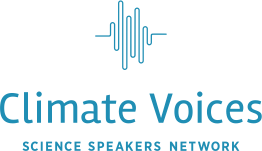Resources for Scientists
Opportunities for Further Engagement
Thank you for submitting your video and joining the growing community of scientists speaking personally about climate change. If you want to do more, you can create additional videos (feel free to contact us to discuss possible topics); watch your fellow scientists’ videos and share them with your family, friends and colleagues; and get connected with these organizations doing important work at the intersection of science and communication.
![]() The Union of Concerned Scientists: Join their Science Network, a community of more than 17,000 scientists, engineers, economists, public health specialists, and other experts across the country working to educate the public and inform decisions critical to our health, safety, and environment. The Science Network provides resources and opportunities that are geared towards experts like yourself. When you join, you’ll receive emails that are tailored to your expertise and areas of interest. Some of the resources we offer include our webinars on science communication and advocacy, how-to videos, and information on working with the media and policy makers. As a member of the Science Network, you’ll also have opportunities to use your skills on UCS campaigns and make a difference on the issues you’re interested in.
The Union of Concerned Scientists: Join their Science Network, a community of more than 17,000 scientists, engineers, economists, public health specialists, and other experts across the country working to educate the public and inform decisions critical to our health, safety, and environment. The Science Network provides resources and opportunities that are geared towards experts like yourself. When you join, you’ll receive emails that are tailored to your expertise and areas of interest. Some of the resources we offer include our webinars on science communication and advocacy, how-to videos, and information on working with the media and policy makers. As a member of the Science Network, you’ll also have opportunities to use your skills on UCS campaigns and make a difference on the issues you’re interested in.
 Climate Voices: The University Corporation for Atmospheric Research (UCAR) and the United Nations Foundation invite you to consider joining Climate Voices, Science Speakers Network. Climate Voices brings scientists and their local communities, in all corners of the U.S., together for non-partisan dialogue on climate science that speaks to citizens’ current and future well being and responsibility as members of a community and democracy. If you are interested in volunteering for this network, please visit climatevoices.org and create a profile.
Climate Voices: The University Corporation for Atmospheric Research (UCAR) and the United Nations Foundation invite you to consider joining Climate Voices, Science Speakers Network. Climate Voices brings scientists and their local communities, in all corners of the U.S., together for non-partisan dialogue on climate science that speaks to citizens’ current and future well being and responsibility as members of a community and democracy. If you are interested in volunteering for this network, please visit climatevoices.org and create a profile.
Compass: COMPASS is a team of science-based communication professionals that believes scientists have a lot to contribute to essential conversations concerning society. COMPASS helps scientists develop the skills, insight and expertise to engage with the right audiences at the right times. They facilitate connections between scientists, policymakers and the media, thereby creating space for scientists to share their knowledge. They also introduce scientists to each other, and keep track of the scientific trends that are relevant to decision makers.
American Association for the Advancement of Science: The Center for Public Engagement with Science and Technology provides scientists with communication resources, and it also facilitates dialogue between scientists and the public about the benefits, limits and implications of science. AAAS also provides Communication Workshops.
Is This How You Feel? Made a video and you still have more to say? Consider contributing a letter sharing how climate change makes you feel to this awesome project.
Communication Resources
Tips & Trainings from Union of Concerned Scientists: Their resources page for Science Network includes tips for communicating science and archives of past trainings as well as the chance to sign up for upcoming trainings.
AAAS‘ Center for Public Engagement in Science & Technology’s activities focus on providing scientists and scientific institutions with the resources they need to have meaningful conversations with the public.
The American Geophysical Union’s Sharing Science Network provides resources for taking action, participating in policy discussions, using social media and building communication skills. You can join their network or browse their site for resource materials.
COMPASS conducts trainings and workshops as well as coaching to help scientists like you develop your communication skills. Their book, Escape from the Ivory Tower, is a frank, practical and entertaining guide, that’ll help you learn how to engage your audience, ace your interview, promote your paper and enter the political fray.
In Don’t Be Such a Scientist, Randy Olson shares the secrets of talking substance in an age of style. The key, he argues, is to stay true to the facts while tapping into something more primordial, more irrational, and ultimately more human.
The Psychology of Climate Change Communication details many of the biases and barriers to scientific communication and information processing. It offers a tool—in combination with rigorous science, innovative engineering, and effective policy design—to help our societies take the pivotal actions needed to respond with urgency and accuracy to one of the greatest challenges ever faced by humanity: global-scale, human-induced environmental threats, of which the most complex and far reaching is climate change.
Connecting on Climate: A Guide to Effective Climate Change Communication explains how anyone can better communicate with and engage the American public on the issue. It is a joint project between the Center for Research on Environmental Decisions (CRED) at the Earth Institute, Columbia University and ecoAmerica.
Climate Access: Provides a variety of resources including access to a global network of climate and clean energy communicators, serving more than 2,000 members in 57 countries.
